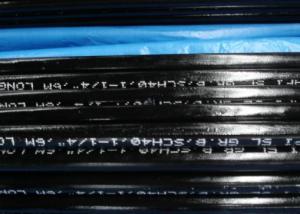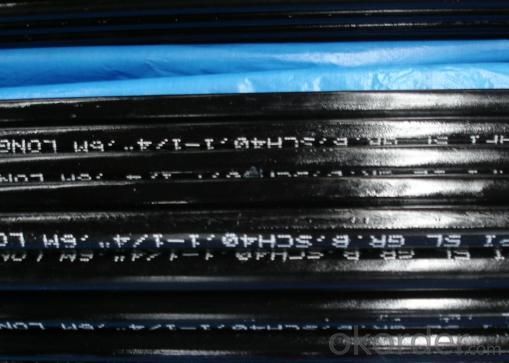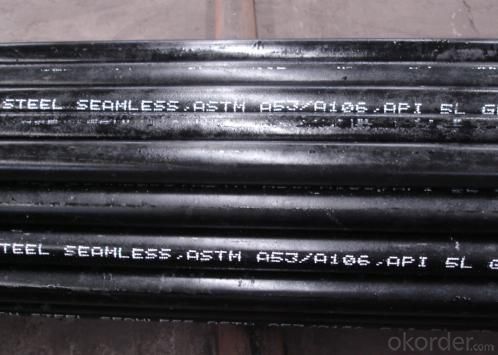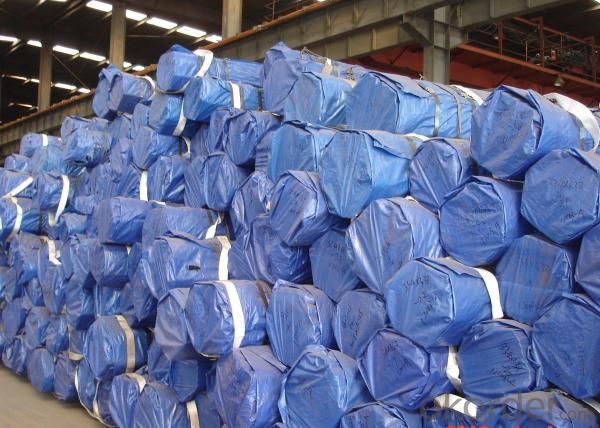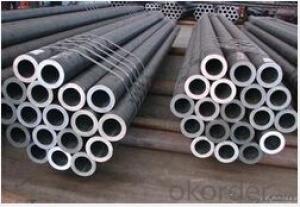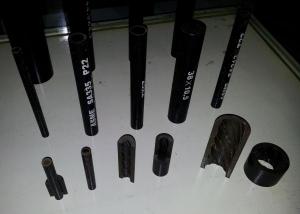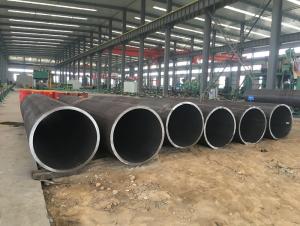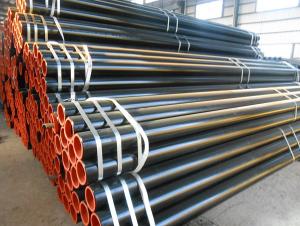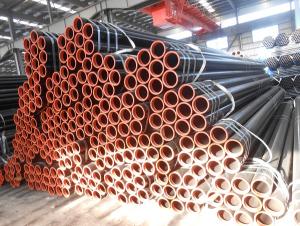Seamless Steel Pipe For Fluid Transmission Service
- Loading Port:
- China Main Port
- Payment Terms:
- TT or LC
- Min Order Qty:
- 20MT m.t.
- Supply Capability:
- 5000 Tons Per Month m.t./month
OKorder Service Pledge
OKorder Financial Service
You Might Also Like
Specifications of Seamless Steel Pipe For Fluid Transmission Service: Standard:Chinese GB/T8163 Main steel pipe grade : 10 、20 (Other grade is also negotiable.) Chemical Compositon & Mechanical Propertise :
| ||||||||||||||||||||||||||||||||||||||||||||||||||||||||||||||||||||||||||
Usage/Applications:
It is used for conveying water,petroleum,gas and other common fluids.
Packaging & Delivery:
Each bundles pipes will be bundled with 6-8 pcs steel strips and with shipping marks and 2 nylon strips
40-50 days delivery on china port upon receiving orinigal LC or prepayment.
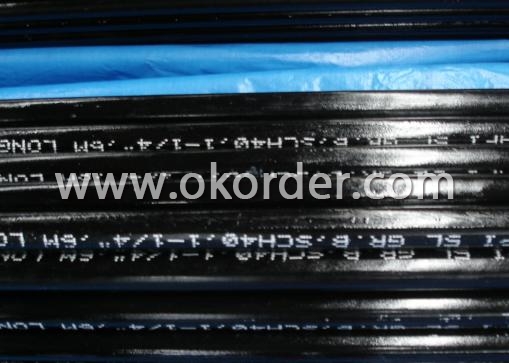
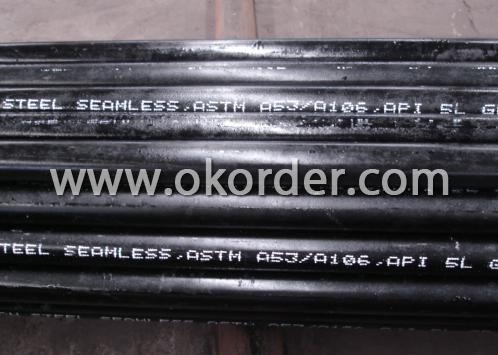
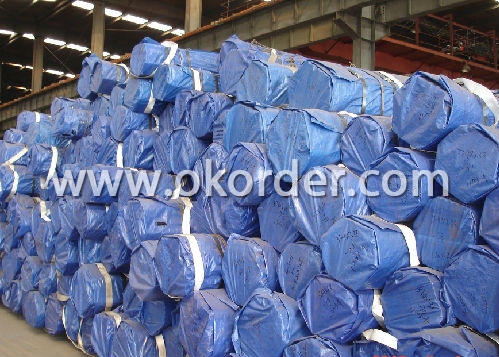
- Q: What is the difference between carbon steel pipes and stainless steel pipes?
- The main difference between carbon steel pipes and stainless steel pipes lies in their composition. Carbon steel pipes are primarily made of iron and carbon, while stainless steel pipes contain iron, carbon, and a minimum of 10.5% chromium. This high chromium content in stainless steel pipes provides excellent corrosion resistance, making them suitable for various applications in industries like food processing, chemical, and oil & gas. On the other hand, carbon steel pipes are more cost-effective and have higher strength than stainless steel pipes, but they are more susceptible to corrosion and thus require regular maintenance and coating for protection.
- Q: Can steel pipes be used for conveyor systems?
- Yes, steel pipes can be used for conveyor systems. Steel pipes are commonly used in conveyor systems due to their high strength, durability, and ability to withstand heavy loads and harsh environments. They provide a reliable and long-lasting solution for transporting various materials in conveyor applications.
- Q: What is the difference between internal coating and external lining of steel pipes?
- Steel pipes can be protected from corrosion and damage through two different methods: internal coating and external lining. When it comes to internal coating, a protective layer or coating is applied to the inner surface of the steel pipe. This is done to prevent corrosion or damage caused by the fluid or substance being transported through the pipe. Common materials used for the coating include epoxy, polyurethane, or polyethylene. These materials create a barrier between the pipe and the transported material, thus extending the pipe's lifespan and preserving the quality of the transported material. On the other hand, external lining involves applying a protective layer or lining to the outer surface of the steel pipe. The purpose of this is to shield the pipe from external elements like soil, moisture, chemicals, and physical damage. Materials such as polyethylene, polypropylene, or fusion-bonded epoxy are typically used for the external lining. By acting as a barrier, the lining prevents corrosive substances from coming into contact with the pipe and causing harm. Additionally, it helps maintain the pipe's structural integrity and prevents the formation of leaks or cracks. To summarize, the main distinction between internal coating and external lining of steel pipes lies in where the protective layer is applied. Internal coating focuses on the inner surface of the pipe, while external lining concentrates on the outer surface. While both methods aim to safeguard the pipe from corrosion and damage, they address different aspects of pipe protection.
- Q: Can steel pipes be used for underground fuel pipelines?
- Yes, steel pipes can be used for underground fuel pipelines. Steel pipes are commonly used for various types of pipelines due to their durability, strength, and resistance to corrosion. When it comes to underground fuel pipelines, steel pipes are a popular choice due to their ability to withstand high pressure and temperature fluctuations. Additionally, steel pipes provide excellent protection against external elements, such as soil movement or chemical reactions, ensuring the safety and integrity of the fuel transportation system. Proper insulation and coating can further enhance the corrosion resistance of steel pipes, making them a reliable option for underground fuel pipelines.
- Q: What is the difference between hot-dip galvanizing and electroplating for steel pipes?
- Steel pipes can be protected from corrosion using hot-dip galvanizing or electroplating, but these methods have distinct differences. With hot-dip galvanizing, the steel pipes are immersed in molten zinc, creating a strong bond with the steel. This results in a thick and durable zinc coating that effectively prevents corrosion. The entire surface of the pipe, both inside and outside, is uniformly covered, making hot-dip galvanizing ideal for comprehensive protection. Electroplating, on the other hand, involves depositing a thin layer of metal, usually zinc, onto the steel surface using an electric current. Unlike hot-dip galvanizing, electroplating does not form a metallurgical bond between the zinc and steel. Instead, it forms a mechanical bond, which is weaker and less long-lasting. The electroplated zinc layer is also thinner, offering less corrosion protection compared to hot-dip galvanizing. The application process is another point of differentiation. Hot-dip galvanizing requires immersion in molten zinc, which can be time-consuming. Electroplating, on the other hand, uses an electrolytic cell for zinc coating application, which is faster and more efficient. In conclusion, the thickness, durability, and bonding mechanism between zinc and steel distinguish hot-dip galvanizing from electroplating for steel pipes. Hot-dip galvanizing provides a thicker, longer-lasting coating with a metallurgical bond, making it superior for extended corrosion protection. Electroplating, however, creates a thinner coating with a mechanical bond, suitable for applications where a less robust level of corrosion resistance is acceptable.
- Q: What are the advantages of PVC pipe and galvanized steel pipe?
- Galvanized steel pipe is also used, because some areas require the use of strength. Moreover, the iron and steel industry is a pillar industry, there are some unspoken rules in it.
- Q: How are steel pipes insulated for thermal efficiency?
- Steel pipes are insulated for thermal efficiency by adding a layer of insulation material around them. This insulation helps to reduce heat transfer through the pipes, preventing energy loss and maintaining the desired temperature.
- Q: Are steel pipes suitable for underground installations in areas with high moisture content?
- In areas with high moisture content, steel pipes are commonly used for underground installations. However, it is important to consider certain factors when utilizing steel pipes in such conditions. Prolonged exposure to moisture can lead to corrosion, which is a significant concern. To mitigate this risk, it is crucial to employ steel pipes that are specifically designed for underground installations and are coated with protective materials like epoxy or polyethylene. These protective coatings act as a barrier between the steel and the surrounding moisture, preventing corrosion and prolonging the lifespan of the pipes. Furthermore, proper installation techniques, including sufficient pipe bedding and backfilling, must be adhered to in order to ensure that the pipes are adequately supported and shielded from external forces. Regular inspection and maintenance are also advisable to promptly identify any signs of corrosion or damage and address them accordingly. Overall, by taking the appropriate precautions and conducting regular maintenance, steel pipes can be a viable choice for underground installations in areas with high moisture content.
- Q: How do steel pipes handle water hammer in high-rise buildings?
- Steel pipes in high-rise buildings are designed to handle water hammer through various measures. Firstly, steel pipes have high strength and durability, allowing them to withstand the sudden pressure surges caused by water hammer. Additionally, steel pipes are often installed with shock absorbers or surge tanks to reduce the impact of water hammer. These devices absorb and dissipate the excess energy generated during water hammer, preventing damage to the pipes and fittings. Moreover, proper pipe sizing, layout, and support systems are implemented to minimize the effects of water hammer, ensuring the smooth and efficient flow of water in high-rise buildings.
- Q: What are the different grades of steel used for manufacturing pipes?
- The different grades of steel used for manufacturing pipes vary depending on their intended applications. Some common grades include carbon steel, stainless steel, and alloy steel. Carbon steel is commonly used for general-purpose piping due to its affordability and strength. Stainless steel is preferred for corrosive environments or high-temperature applications due to its resistance to corrosion. Alloy steel, on the other hand, offers improved strength and durability and is often used for specialized applications such as oil and gas pipelines.
1. Manufacturer Overview
| Location | Wuxi, China |
| Year Established | 1991 |
| Annual Output Value | 300,000Tons |
| Main Markets | Europe; Southeast Asia; etc. |
| Company Certifications | API 5L;API 5CT;API Q1;ISO/TS29001 |
2. Manufacturer Certificates
| a) Certification Name | |
| Range | |
| Reference | |
| Validity Period |
3. Manufacturer Capability
| a) Trade Capacity | |
| Nearest Port | Wuxi; Shanghai |
| Export Percentage | 41% - 50% |
| No.of Employees in Trade Department | 3900-4000 People |
| Language Spoken: | English; Chinese; Spanish |
| b) Factory Information | |
| Factory Size: | Above 450,000 square meters |
| No. of Production Lines | Above 10 |
| Contract Manufacturing | OEM Service Offered;Design Service Offered |
| Product Price Range | Average |
Send your message to us
Seamless Steel Pipe For Fluid Transmission Service
- Loading Port:
- China Main Port
- Payment Terms:
- TT or LC
- Min Order Qty:
- 20MT m.t.
- Supply Capability:
- 5000 Tons Per Month m.t./month
OKorder Service Pledge
OKorder Financial Service
Similar products
Hot products
Hot Searches
Related keywords
